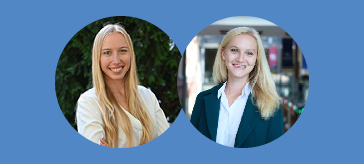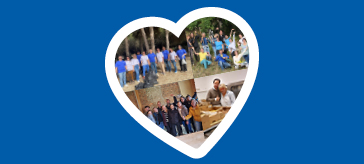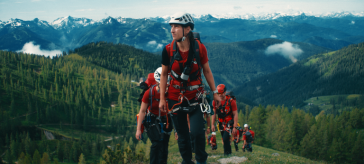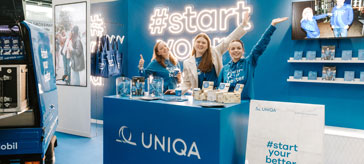
"Employer Branding should be human”
Read interview
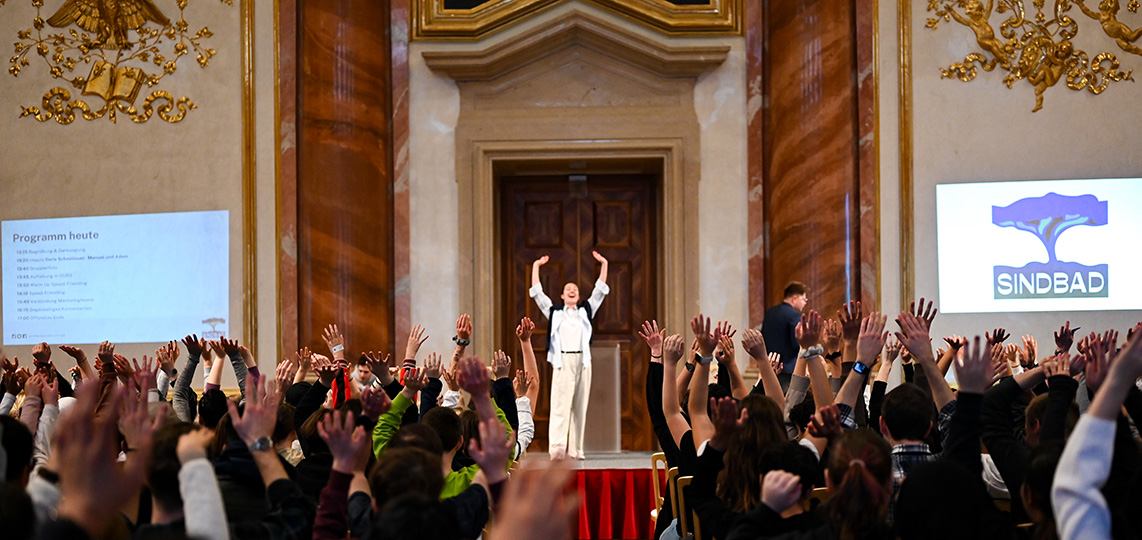


In almost ten years, the Sindbad social business has supported around 5,000 young people in developing and pursuing their talents and potential, and UNIQA has been following this path together with Sindbad since 2019.
Every year, mentors – including young UNIQA employees between the ages of 20 and 35 – accompany a 13- to 19-year-old student at a secondary school, polytechnic school or specialised secondary school for twelve months. The task: mentor and student work together to think about possible further education and training paths, goals and take the first steps towards a successful entry into a secondary school or apprenticeship.
We interviewed two UNIQA mentors about their commitment, personal motivation and lessons learnt from their mentoring time with Sindbad.
Angela: Orientation after compulsory schooling can be quite challenging; especially if you don't have much support. I wanted to be there for young people in this phase as a contact person who simply listens, thinks along with them and can provide a bit of guidance from their own experience.
Magdalena: I chose the Sindbad mentoring programme because I wanted to do something meaningful and make a positive contribution. Youth unemployment is a big issue in Austria in particular, and many young people don't have the same support on their educational path. Not all of them have parents who know the Austrian school system well or can give them specific advice. It was important to me to give a young person guidance, boost their self-confidence and help them recognise and make use of their own opportunities. At the same time, I found the idea of getting to know new perspectives myself and growing personally through the exchange exciting.
Angela: We are in regular contact. Sometimes we just write, sometimes we meet in person, e.g. in the park or in a coffee house. In more intensive phases, such as school selection or applications, we were in closer contact. The main aim is to develop perspectives together and boost self-confidence.
Magdalena: I met with my mentee roughly every three weeks, but we were also in constant dialogue in between - be it via voice messages or phone calls. Our meetings were a mixture of practical support and personal conversations. We wrote job applications together, as she was looking for a Saturday job, and discussed her future school career. We researched suitable schools and organised maths tutoring to improve her grades and give her a real chance of getting the school place she wanted.
But it wasn't just about ‘serious’ topics - we also had lots of relaxed conversations and a great exchange, whether it was eating ice cream, at the Christmas market or on a relaxed walk in Innsbruck city centre.
What surprised me most when working with my mentee is how much can be achieved when you take young people seriously and meet them at eye level. A little trust from the outside is often enough to make them believe in themselves again.
Angela: Yes, above all it has shown me how central the role of educational institutions is - and how valuable it is when organisations outside the school system, such as Sindbad, also support young people. This interaction goes a long way towards ensuring that young people get the support they need to find their way and be able to follow it.
Magdalena: Many young people have little idea of what they want to do later or what next steps are important for them right now. The school system is often very complex - it can be a big challenge for young people whose parents don't know it well themselves. This is where mentoring comes in: It gives them guidance, boosts their self-confidence and helps them to make their own decisions. Especially in a society where educational opportunities are often unequally distributed, a programme like this can make a big difference.
I have realised how insecure young people often are at this stage of their lives and how important even small impulses can be. Sometimes it is enough to encourage them or show them a new perspective to initiate a big change. I have also developed my own communication skills and learnt to empathise even better with other realities of life. Mentoring has shown me that listening and trust can have a big impact.
Angela: Just do it! You don't have to be a professional - the important thing is that you are genuinely interested and have the time. It's an experience that not only gives a lot to the mentee, but also to yourself.Magdalena: It's a great experience where you not only help others but also learn an incredible amount yourself. You get out of your own comfort zone and develop new perspectives. You don't need perfect answers to everything - it's enough to be open and patient, to listen and simply be there as a contact person. Sometimes it is a great help to show young people who they can turn to or how they can find their own way.
About Angela and Magdalena:
Angela Achleitner is the central contact person for sustainability in the Retail Austria division at UNIQA. She ensures that sustainability is innovatively integrated into products as a cross-cutting issue and communicated specifically in sales in order to creatively implement the company-wide strategy for the retail customer segment. With her constant interest in learning new things and her commitment to social projects, she combines expertise with social responsibility - both professionally and privately.
Magdalena Lisa Manzl works in the Group ESG Office, where she is responsible for social sustainability - particularly in the areas of employee engagement and ESG-related training initiatives. She is also involved in the further development of strategic sustainability approaches and is involved in Group-wide projects, such as the annual sustainability reporting. She began her career in finance, where sustainability has played a central role for her from the very beginning. She is therefore all the more pleased to be able to combine her expertise in finance with her commitment to sustainability in her current position.
Magdalena (left) and Angela
Read interview
Read more
Read more
